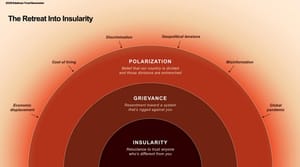In episode 455 of the For Immediate Release podcast in March, Shel Holtz and I discussed the claim that traditional PR is dead (again). At the time, we reflected on Lulu Cheng Meservey’s manifesto encouraging startup business leaders to bypass agencies and “go direct” with their own communication efforts.
Different though it is in its thrust, an article I recently stumbled across by Mark McGrath on Substack shares a similar starting point: the idea that traditional PR, as we've long known it, no longer works.
In his article titled PR War Is Now, McGrath goes much further, arguing that in today’s fast-moving, narrative-saturated world, the battle is no longer about pushing messages. Instead, it's about shaping perception and controlling orientation – how people filter and interpret information.
McGrath believes that successful communicators must think like special operations teams, operating with speed, agility, and strategic clarity, especially during crises. Narrative leadership, not message discipline, is the future of influence, he says, requiring proactive manoeuvring rather than reactive defence.
For PR professionals, the call to action seems to be to stop thinking of PR as message control and start operating as a “strategic perception unit.” Build real-time intelligence, decentralise decision-making, rehearse crises, lead narratives proactively, and embed communication deeply into your organisational strategy.
A Distinct Perspective on PR’s Future
This is thought-provoking without doubt. McGrath argues for employing strategies that prioritise speed, adaptability, and strategic framing. Undoubtedly influenced by his military background, his focus on adaptability, decentralised decision-making, and narrative control offers a distinct perspective on modern public relations and leadership challenges.
McGrath's vision may not sit easily with everyone – it challenges many traditional assumptions about what PR is and should be. Yet as the media environment grows ever faster and more chaotic, and as political polarisation exerts a troubling influence everywhere we look, his argument is hard to ignore.
The question for communicators is no longer whether change is needed, but how far they are willing to go.
☑️ Related Reading:
- For Immediate Release Podcast Episode 455: Traditional PR is Dead (Again)
- Mark McGrath on Substack: PR War Is Now — Why PR as We Know It Is Dead




















